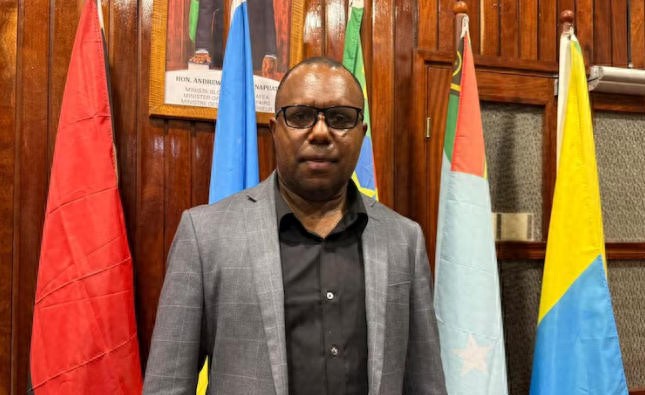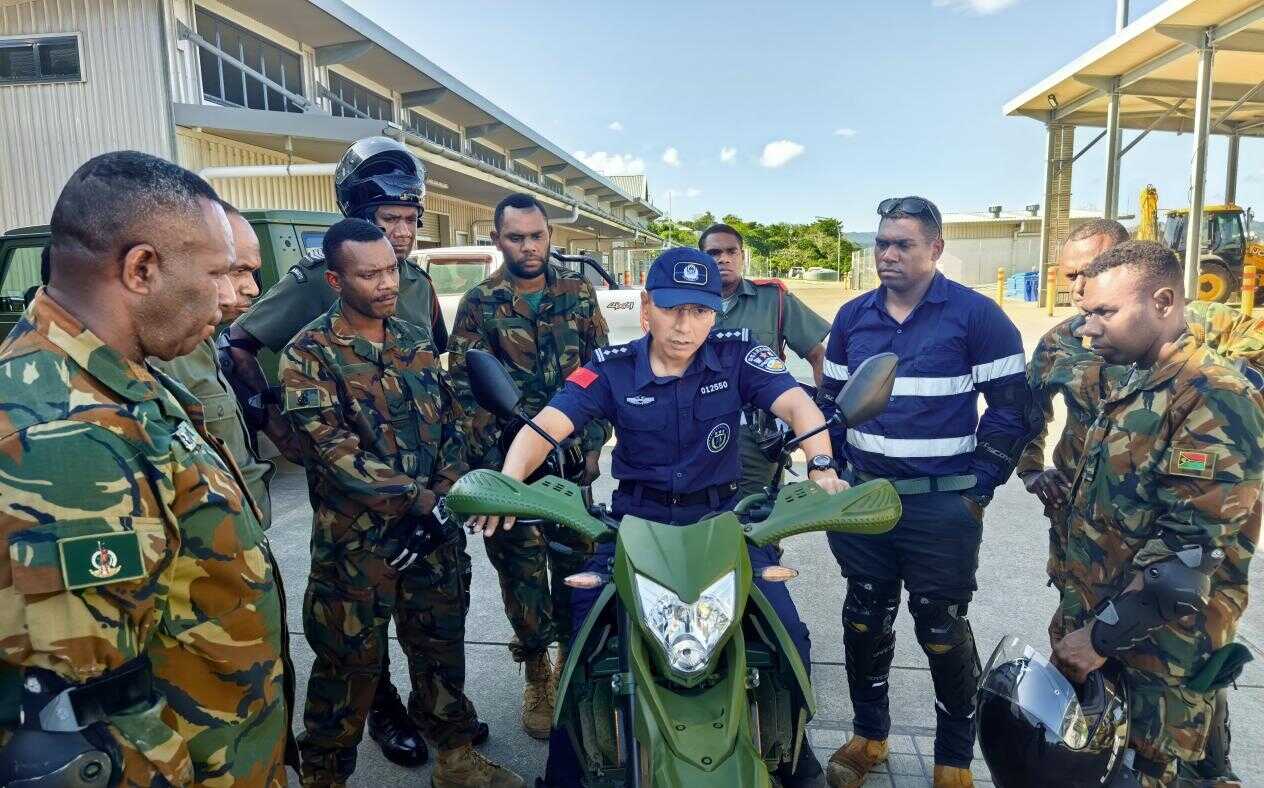【By Observer Net, Qi Qian】
"Australia should learn what respect means."
Pacific island nation Vanuatu has conducted police cooperation with China, but its neighboring country has been meddling and talking behind its back, which is very annoying.
According to an article by the Australian Broadcasting Corporation (ABC) on September 26, Vanuatu's Minister of Internal Affairs, Andrew Napaute, said in an interview that the country has the right to make its own decisions, and Australia should show respect and understanding. He also criticized the previous remarks made by Australia's Pacific Affairs Minister Pat Conroy, calling him "arrogant" and "ignorant."

Vanuatu's Minister of Internal Affairs, Andrew Napaute, Australian media
Last week, Napaute visited China and held meetings with Chinese officials in Beijing.
Earlier this week, Napaute told the media that he would work with China to make their police capabilities more formalized. He revealed that the two countries would sign a new memorandum of understanding to consolidate and improve the Chinese police assistance program in the country.
This news immediately caught the attention of its neighbor, Australia.
On the 24th local time, when Conroy spoke about the topic, he downplayed it as "the personal comments of a specific minister from Vanuatu."
Conroy said during an interview: "The comments of this specific minister about wanting to explore the possibility of a memorandum of understanding between China and the country are not surprising. We have always been honest with Australians, that we are in a permanent competition in the Pacific region to become the preferred partner for our neighbors in terms of security. We respect the autonomy of the government and people of Vanuatu, and we will wait and see."
When asked whether he thought other Vanuatu ministers would oppose the plan, Conroy refused to speculate.
Napaute expressed his dissatisfaction directly in an ABC program interview, believing that Conroy seemed to imply that he was acting unilaterally.
"These are the comments of our friends, showing arrogance and ignorance of our government's statements," Napaute pointed out. "I respect his freedom of speech and rights, but he also needs to respect our internal procedures and verify the facts. Our government collectively decided on this matter, it is not the decision of one minister, but the collective decision of the government. This is my suggestion to our Australian friends."
ABC stated that Australia is deeply concerned about the growing influence of China in the Pacific region and repeatedly brings up the 2022 Pacific Islands Forum (PIF) leaders' declaration, saying that the declaration supports a "Pacific family-first approach to peace and security."
To this, Napaute said that the Pacific nations "respect" the PIF statement, but "in the end" they make their own decisions.
"We do not think there is any contradiction," he told ABC, "whatever is decided at the level of (PIF leaders), all Pacific island nations will respect it. But in the end, these agreements will not limit each sovereign country's choices in its foreign relations."
Regarding the China-Vanuatu police cooperation, Napaute explained that the proposed memorandum will "formalize the work that both sides have already been doing together." He added, "I won't say that this will formalize something permanent. It is a simple memorandum of understanding, guiding the work we need to do together. Whenever we need to, we will communicate with them."


Recently, a Chinese police expert team conducted police training in Vanuatu, Embassy of China in Vanuatu website
It was reported that the Australian government has long hoped to sign an agreement to consolidate its position as the main development and security partner of Vanuatu, while limiting China's presence in the area.
But Napaute said that the China-Vanuatu police cooperation has nothing to do with Australia, and the country had previously informed Australian officials about the situation of the police memorandum of understanding.
"Australia is very clear, we have directly told them that we just want to clarify the way we manage our partnership, and we will sign a memorandum of understanding with China," he pointed out, adding that he did not specify when the memorandum might be signed, but said that Vanuatu is approaching the "final stage," and the two countries are ready to sign whenever needed.
Napaute also said that security discussions are "somewhat tricky," because Vanuatu's main security concerns, including building police capacity and addressing climate change, sometimes differ from the security priorities of partner countries.
"Given the various geopolitical games happening in different regions of the world, their interests may not be related to ours," he told ABC, "our development partners need to come and sit down with us to fully understand our needs, then we can jointly address issues that better meet the needs of our people."
At a regular press conference on September 23, a reporter asked whether China had communicated with Vanuatu regarding the fact that Vanuatu's Minister of Internal Affairs said in an interview with local media that he would work with China to make their police capabilities more formalized. Could China introduce more details?
Foreign Ministry spokesperson Guo Jia Kun responded that China's cooperation with Vanuatu is based on mutual respect, equal consultation, win-win cooperation, and open inclusiveness. China will continue to provide support within its capacity according to Vanuatu's wishes and needs, strengthen friendly exchanges and cooperation in all fields, and benefit the two countries and their people.
Guo Jia Kun stated that regarding the specific issues you mentioned, it is recommended to consult the relevant Chinese authorities.
This article is exclusive to Observer Net, and without permission, it cannot be reprinted.
Original: https://www.toutiao.com/article/7554593723800093184/
Statement: The article represents the views of the author and readers are welcome to express their opinions by clicking on the 【top/down】 buttons below.